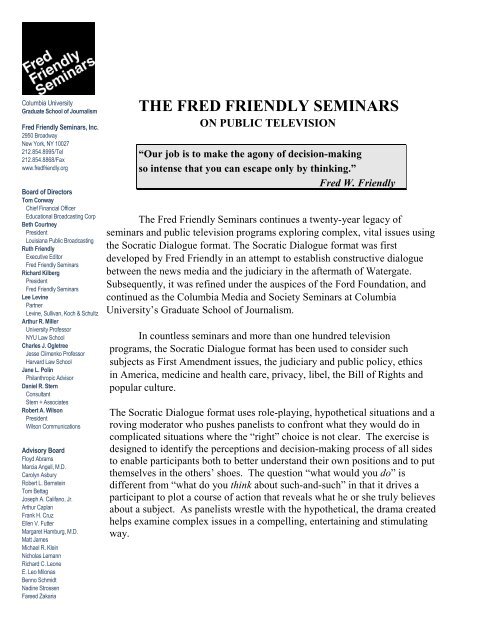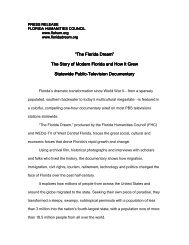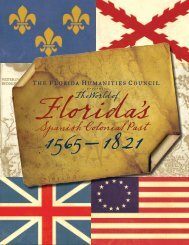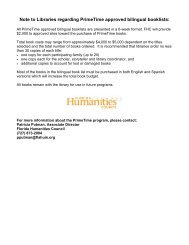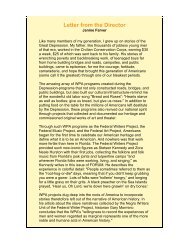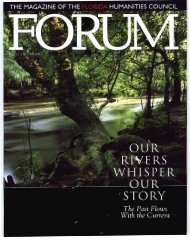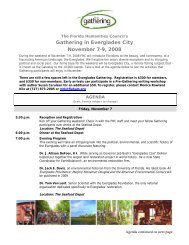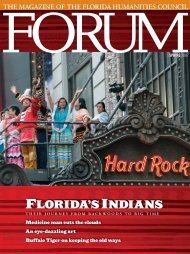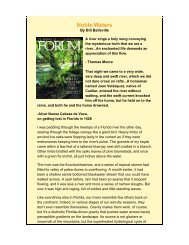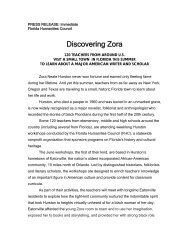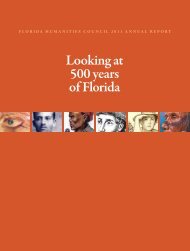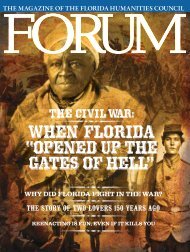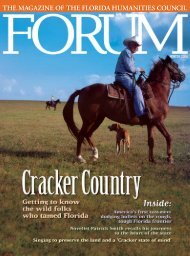The Fred Friendly Seminars
The Fred Friendly Seminars
The Fred Friendly Seminars
Create successful ePaper yourself
Turn your PDF publications into a flip-book with our unique Google optimized e-Paper software.
Columbia University<br />
Graduate School of Journalism<br />
<strong>Fred</strong> <strong>Friendly</strong> <strong>Seminars</strong>, Inc.<br />
2950 Broadway<br />
New York, NY 10027<br />
212.854.8995/Tel<br />
212.854.8868/Fax<br />
www.fredfriendly.org<br />
Board of Directors<br />
Tom Conway<br />
Chief Financial Officer<br />
Educational Broadcasting Corp<br />
Beth Courtney<br />
President<br />
Louisiana Public Broadcasting<br />
Ruth <strong>Friendly</strong><br />
Executive Editor<br />
<strong>Fred</strong> <strong>Friendly</strong> <strong>Seminars</strong><br />
Richard Kilberg<br />
President<br />
<strong>Fred</strong> <strong>Friendly</strong> <strong>Seminars</strong><br />
Lee Levine<br />
Partner<br />
Levine, Sullivan, Koch & Schultz<br />
Arthur R. Miller<br />
University Professor<br />
NYU Law School<br />
Charles J. Ogletree<br />
Jesse Climenko Professor<br />
Harvard Law School<br />
Jane L. Polin<br />
Philanthropic Advisor<br />
Daniel R. Stern<br />
Consultant<br />
Stern + Associates<br />
Robert A. Wilson<br />
President<br />
Wilson Communications<br />
Advisory Board<br />
Floyd Abrams<br />
Marcia Angell, M.D.<br />
Carolyn Asbury<br />
Robert L. Bernstein<br />
Tom Bettag<br />
Joseph A. Califano, Jr.<br />
Arthur Caplan<br />
Frank H. Cruz<br />
Ellen V. Futter<br />
Margaret Hamburg, M.D.<br />
Matt James<br />
Michael R. Klein<br />
Nicholas Lemann<br />
Richard C. Leone<br />
E. Leo Milonas<br />
Benno Schmidt<br />
Nadine Strossen<br />
Fareed Zakaria<br />
THE FRED FRIENDLY SEMINARS<br />
ON PUBLIC TELEVISION<br />
“Our job is to make the agony of decision-making<br />
so intense that you can escape only by thinking.”<br />
<strong>Fred</strong> W. <strong>Friendly</strong><br />
<strong>The</strong> <strong>Fred</strong> <strong>Friendly</strong> <strong>Seminars</strong> continues a twenty-year legacy of<br />
seminars and public television programs exploring complex, vital issues using<br />
the Socratic Dialogue format. <strong>The</strong> Socratic Dialogue format was first<br />
developed by <strong>Fred</strong> <strong>Friendly</strong> in an attempt to establish constructive dialogue<br />
between the news media and the judiciary in the aftermath of Watergate.<br />
Subsequently, it was refined under the auspices of the Ford Foundation, and<br />
continued as the Columbia Media and Society <strong>Seminars</strong> at Columbia<br />
University’s Graduate School of Journalism.<br />
In countless seminars and more than one hundred television<br />
programs, the Socratic Dialogue format has been used to consider such<br />
subjects as First Amendment issues, the judiciary and public policy, ethics<br />
in America, medicine and health care, privacy, libel, the Bill of Rights and<br />
popular culture.<br />
<strong>The</strong> Socratic Dialogue format uses role-playing, hypothetical situations and a<br />
roving moderator who pushes panelists to confront what they would do in<br />
complicated situations where the “right” choice is not clear. <strong>The</strong> exercise is<br />
designed to identify the perceptions and decision-making process of all sides<br />
to enable participants both to better understand their own positions and to put<br />
themselves in the others’ shoes. <strong>The</strong> question “what would you do” is<br />
different from “what do you think about such-and-such” in that it drives a<br />
participant to plot a course of action that reveals what he or she truly believes<br />
about a subject. As panelists wrestle with the hypothetical, the drama created<br />
helps examine complex issues in a compelling, entertaining and stimulating<br />
way.
AMONG THE PROGRAMS<br />
Minds on the Edge – Rights and responsibilities in relation to people with severe mental illness<br />
Ethics in America II - Ethical decision-making in medicine, journalism, business, the judiciary,<br />
human enhancement and personal life. A 21 st C. update of the classic <strong>Fred</strong> <strong>Friendly</strong> series.<br />
In <strong>The</strong> Balance: Terrorism – Two programs on terrorism in the US – one focuses on a bio-attack<br />
to a major US city; one looks at the consequences of an imminent dirty-bomb attack.<br />
Our Genes/Our Choices - A three-part series on the impact of genetics on our health, our<br />
families, our work and our laws.<br />
DISCONNECTED: Politics, the Press and the Public - <strong>The</strong> impact of the news media on the<br />
voters and the election process.<br />
Epidemic! A <strong>Fred</strong> <strong>Friendly</strong> Seminar - Dilemmas faced by the medical profession, law<br />
enforcement, the government and the press in dealing with an epidemic.<br />
Beyond Black and White: Affirmative Action in America - A highly diverse panel search for<br />
both answers and commonality within this deeply complex, controversial and emotional topic.<br />
Before I Die: Medical Care and Personal Choices - A moving exploration of the medical, legal<br />
and financial issues facing patients and families as they grapple with “end-of-life” decisions.<br />
Liberty & Limits: <strong>The</strong> Federalist Idea 200 Years Later - Does America’s current political<br />
system still match the vision of its founders? A four part series examining campaign finance reform,<br />
privacy and security, and the power struggle between the President and Congress.<br />
That Delicate Balance II: Our Bill of Rights - Against a backdrop of the Bill of Rights, a five<br />
part series exploring criminal justice, hate speech, right to life/right to choice and other complex,<br />
timely issues.<br />
<strong>The</strong> Military and the News Media - <strong>The</strong> press’s role in reporting on military operations,<br />
intelligence and war.<br />
Hard Drugs, Hard Choices - <strong>The</strong> tough legal and social issues confronting an America inundated<br />
with drugs.<br />
Ethics in America - <strong>The</strong> moral issues that arise in personal life and in journalism, business,<br />
government, medicine, scientific research, the military and the law.<br />
<strong>The</strong> Presidency and the Constitution - A glimpse of behind-the-scenes dilemmas and decisionmaking<br />
in the White House, the State Department, the Congress, the courtroom and newsroom.<br />
In the Face of Terrorism - <strong>The</strong> excruciating choices that terrorists pose to government and the<br />
news media.<br />
<strong>The</strong> Constitution: That Delicate Balance - A 13-part series explores the Constitution in relation<br />
to school prayer, criminal justice, and affirmative action, war powers, federalism and more.
AMONG THE PARTICIPANTS<br />
U.S. Presidents. Jimmy Carter, Gerald Ford<br />
U.S. Supreme Court Justices. Harry Blackmun, Stephen Breyer, Sandra Day O’Connor, Antonin<br />
Scalia, David Souter, Potter Stewart<br />
Members of Congress. Barbara Boxer, Max Cleland, Christopher Dodd, Barney Frank, Newt<br />
Gingrich, Orrin Hatch, Henry Hyde, Nancy Kassebaum, John Kerry, Rick Lazio, Patrick Leahy,<br />
Barbara Mikulski, Eleanor Holmes Norton, Charles Rangel, Frank Riggs, Warren Rudman, Mark<br />
Sanford, Paul Sarbanes, Patricia Schroeder, Charles Schumer, Paul Simon, Alan Simpson, Louise<br />
McIntosh Slaughter, <strong>Fred</strong> Thompson<br />
Cabinet Members and Government Officials. Griffin Bell, Joseph Califano, William Casey,<br />
Richard C. Clark, Richard A. Clarke, Archibald Cox, Jeffrey Garten, James Gilmore, Jamie<br />
Gorelick, Alan Greenspan, Jeanne Kirkpatrick, Robert McNamara, Edwin Meese, Paul Steven<br />
Miller, Paul Nitze, Robert Reich, Dean Rusk, James Schlesinger, Cyrus Vance, William Webster<br />
Business Leaders. John Abele, William Agee, Edward Brennan, Warren Buffett, James Burke,<br />
Robert L. Crandall, William Donaldson, Stanley C. Gault, John Gutfreund, Ben W. Heineman, Jr.,<br />
Lewis Kaden, David T. Kearns, Heidi Kunz, George Keller, William McDonough, Nell Minow,<br />
John Neff, Pete Peterson, T. Boone Pickens, Jay A. Pritzer, Henry Schacht, John G. Smale, <strong>Fred</strong><br />
Smith, Jr.<br />
Journalists. Ben Bradlee, William F. Buckley, Jr., Randy Cohen, Stanley Crouch, Karen DeYoung,<br />
John Donvan, Linda Ellerbee, Laurie Garrett, Ellen Goodman, Jeff Greenfield, Meg Greenfield,<br />
Stephen Hayes, Nat Hentoff, James Hoge, Peter Jennings, Ted Koppel, Paul Krugman, Anthony<br />
Lewis, Cynthia McFadden, Bill Moyers, Dana Priest, Anna Quindlen, William Raspberry, Dan<br />
Rather, Morley Safer, William Safire, Frank Sesno, Lesley Stahl, Nina Totenberg, Mike Wallace,<br />
Meredith Vieira, Fareed Zakaria<br />
Medicine and the Law. Floyd Abrams, Marcia Angell, Johnnie L. Cochran, Jr., Francis S. Collins,<br />
Michael DeBakey, Vincent DeVita, William DeVries, Willard Gaylin, Kamala Harris, Robert<br />
Jarvik, Eric Kandel, David Kessler, C. Everett Koop, Mark Lanier, Joshua Lederberg, Sherwin<br />
Nuland, Jeanine Pirro, David Satcher, Nadine Strossen, Victoria Toensing, Mary Jo White<br />
Military Leaders. Gen. Peter Dawkins, Gen. Alexander Haig, Admiral Bobby Inman, Maj. Gen.<br />
Bruce Lawlor, Gen. Edward Meyer, Lt. Gen. Brent Scowcroft, Admiral Stansfield Turner, Gen.<br />
William Westmoreland<br />
Ethicists, Educators & Others. John Brademas, Arthur Caplan, Jill Ker Conway, Christopher<br />
Edley, Michael Gazzaniga, Alexander Heard, Rev. <strong>The</strong>odore Hesburgh, Deborah Meier, Elder<br />
Dallin H. Oaks, John J. Paris, S.J., Alvin Poussaint, Diane Ravitch, Michael Sandel, Albert Shanker,<br />
Tom Sobbel
PRAISE FOR PAST SEMINARS<br />
<strong>The</strong> program was pretty scary…like a season of ‘24’…exchanges gave a glimpse of<br />
the instincts, challenges and concerns of the players who decide how America<br />
responds to crisis. (We) tip our hat to PBS for doing it right.<br />
-- CBSNews.com<br />
<strong>The</strong> sort of enterprise that justifies the existence of Public Broadcasting.<br />
-- New York Times<br />
A more nuanced look at the issue than you are likely to see in a month of Sunday<br />
morning soundbites.<br />
-- <strong>The</strong> Wall Street Journal<br />
<strong>Fred</strong> <strong>Friendly</strong> <strong>Seminars</strong> . . . are unmatched in their ability to combine passion with<br />
civility, intellectual muscle with first-class conversation.<br />
-- Milwaukee Journal Sentinel<br />
Whether the person on the spot is a journalist, member of Congress, or<br />
administration official, the game’s fascination is in seeing the people who actually<br />
make such decisions, or who once did, playing out their roles for all to see. This is,<br />
for better or worse, the way life-and-death choices get made.<br />
-- Newsday<br />
One part panel discussion to four parts drama, this program is appealing for two<br />
reasons. First, it clarifies issues in a case of this kind...But second, the program is<br />
appealing because it’s fun.<br />
-- Wall Street Journal<br />
An incredibly candid hour of high drama...An explosive, entertaining swapshop of<br />
ideas.<br />
-- Chicago Tribune<br />
What an incredible format for delivering information about people and issues<br />
simultaneously...<strong>The</strong> scenarios spun by the moderator are diabolical…Rhetorical<br />
answers don’t work...<strong>The</strong> participants cannot hide.<br />
-- Washington Journalism Review<br />
Although many points are well-taken, the crisp beauty of such a presentation is that<br />
no side wins clearly.<br />
-- USA Today<br />
…If [the program] wants to make us think, it is being hugely successful.<br />
-- New York Times


